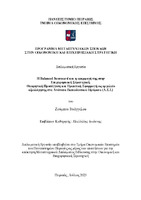Η balanced scorecard και η εφαρμογή της στην επιχειρησιακή στρατηγική. Θεωρητική προσέγγιση και πρακτική εφαρμογή ως εργαλείο αξιολόγησης στα Ανώτατα Εκπαιδευτικά Ιδρύματα (Α.Ε.Ι.)
The balanced scorecard and its application in business strategy. Theoretical approach and practical application as an evaluation tool in higher education institutions

View/
Keywords
Balanced scorecard ; Επιχειρησιακή στρατηγική ; Εργαλείο αξιολόγησης ; Ανώτατα Εκπαιδευτικά ΙδρύματαAbstract
The purpose of this master's thesis is to present the model of the Balanced
Scorecard (BSC) through the original model of Kaplan & Norton (1992).
Initially, many studies have been conducted to investigate the
effectiveness of the BSC in organizations and businesses. It is observed
that many organizations adopt different perspectives appropriate to their
operations according to their vision, mission and strategic issues.
However, several researchers have pointed out the importance of BSC for
higher education institutions. However, previous studies have not
determined which perspectives are more relevant for public Higher
Education Institutions, which are not for-profit in nature. Higher
Education Institutions are involved in the routine processes of providing
higher education in colleges, universities and institutions, including
undergraduate and postgraduate studies, vocational and educational
training.
The purpose of this specific work is to identify and highlight the true
essence and importance of the Balanced Scorecard Methodology (BSC)
in the operation of Higher Education and specifically in monitoring its
performance and the ability to adapt to the emerging challenges that arise
as a result of the implementation of key strategies, in order to achieve its
goals.

